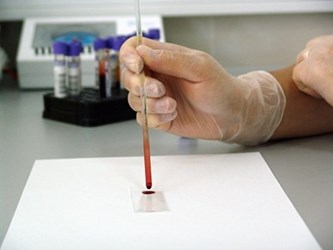New Test Shows Every Virus You've Ever Had — From One Drop Of Blood

While most blood tests can only identify one virus at a time, a new assay developed at the Howard Hughes Medical Institute (HHMI) can, using a single drop of blood, identify all viruses known to infect humans. The researchers believe the technology could prove useful in vaccine development, in the study of chronic illnesses, and in treating certain autoimmune diseases associated with cancer.
The assay, called VirScan, was developed by a team led by Stephen Elledge, an HHMI investigator at Brigham and Women’s Hospital and a professor of genetics and medicine at Harvard University.
According to a study published in Science, Elledge’s team designed the assay to detect more than 1,000 strains of 206 species of viruses by identifying specific antibodies in the blood. The researchers explained that the body begins to produce antibodies within two weeks of an infection, and those antibodies can remain in the blood stream for decades.
“We’ve developed a screening methodology to basically look back in time in people’s blood sera and see what viruses they have experienced,” said Elledge in HMMI News.
In a study spanning four continents, researchers tested VirScan on 569 human donors from the United States, South Africa, Thailand, and Peru, making remarkable discoveries about the basic mechanics of the human immune system and similarities in immune system responses, regardless of a patient’s ethnic or geographic background.
Elledge told HMMI News that the technology already is remarkably sensitive and has demonstrated 95 to 100 percent accuracy in patients known to be infected with HIV or hepatitis C. Some minor viruses or infections from patients’ distant pasts were missed, but Elledge said he was confident the assay’s sensitivity would improve as his team analyzed more blood samples.
Currently, the test only is available for research, and there are no immediate plans for commercial launch, though Elledge commented that the test costs about $25 and could provide savings versus running multiple blood tests.
“Instead of testing for one individual virus at a time, which is labor intensive, we can assay all of these at once,” said Elledge. “It would be one-stop shopping.”
For now, the research possibilities of the new technology are enough to keep scientists busy for decades. The team speculated that the test could shed new light on chronic illnesses that have a viral origin, and could significantly aid scientists in developing vaccines.
William Schaffner, an infection disease expert at Vanderbilt who spoke to the New York Times about the significance of the research, said “This will be a treasure trove for communicable disease epidemiology. It will be like the introduction of the electron microscope. It will allow us to have more resolution at the micro level.”
Elledge told the New York Times that the assay may also have applications his team has not yet imagined. “That’s what happens when you invent technology — you can’t imagine what people will do with it. They’re so clever.”
